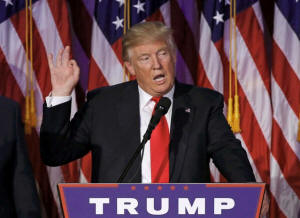|
South Korea says Trump pledged commitment
to its defense
 Send a link to a friend
Send a link to a friend
 [November 10, 2016]
By Jack Kim and Ju-min Park [November 10, 2016]
By Jack Kim and Ju-min Park
SEOUL (Reuters) - U.S. President-elect
Donald Trump pledged his commitment to defending South Korea under an
existing security alliance during a phone call with South Korean
President Park Geun-hye on Thursday, her office said.
Trump had said during the election campaign he would be willing to
withdraw U.S. military stationed in South Korea unless Seoul paid a
greater share of the cost of the deployment. There are about 28,500 U.S.
troops based in South Korea in combined defense against North Korea.
Park said the alliance between the two countries had grown as they faced
various challenges over the past six decades, adding she hoped the ties
would develop further.
She asked Trump to join in the effort to help minimize the threat from
the North, which has carried out a series of nuclear and missile tests
in defiance of UN Security Council resolutions and sanctions.
Trump agreed with Park and said: "We will be steadfast and strong with
respect to working with you to protect against the instability in North
Korea," the presidential Blue House said.
The official newspaper of the North's ruling Workers' Party said on
Thursday the U.S. wish for North Korea to abandon its nuclear weapons
program "is only a fantasy of a bygone era" and the policy of pressure
and sanctions had failed.

"The only accomplishment of the Obama administration is that it is
leaving behind for the new administration coming next year the burden of
having to deal with a strong nuclear power," Rodong Sinmun said in a
commentary.
It did not mention Trump by name. But Choson Sinbo, a pro-North
newspaper published in Japan and controlled by Pyongyang, said: "Trump
is well advised to learn the lesson of history from Obama's failure.
"Otherwise, the new owner of the White House will be met with the ashes
of the calamity started by the previous owner."
The call between Park and Trump lasted about 10 minutes and Park said
she hoped Trump would be able to visit South Korea soon, according to
the Blue House.
There has been concern in South Korea that a Trump presidency will
demand that Seoul sharply raise its share of the cost of maintaining the
U.S. military presence in the country.
Trump said earlier this year in various media interviews that he would
be willing to withdraw U.S. forces from South Korea and Japan but "would
not do so happily".
"We get paid nothing, we get paid peanuts" for deploying the troops to
South Korea," he said in an interview with CNN.
[to top of second column] |

President elect Donald Trump speaks at election night rally in
Manhattan, New York, U.S., November 9, 2016. REUTERS/Mike Segar

Under a five-year cost-sharing accord reached two years ago, Seoul
agreed to contribute $867 million toward U.S. military costs in
2014, about 40 percent of the total. The deal called for the amount
to rise annually at the rate of inflation.
South Korea believes its share of the cost is much higher when the
vast amount of land occupied by the U.S. forces including a large
area in central Seoul are considered.
Some members of parliament have suggested that the country has
little choice but to consider nuclear armament if U.S. forces are
withdrawn while North Korea continues to develop nuclear weapons and
missiles that could carry them.
South Korea's Defence Ministry spokesman Moon Sang-gyun said on
Thursday the country has paid for its share of the cost of
maintaining the U.S. military and the contribution has been
recognized by the U.S. government and Congress.
South Korea and the United States have also agreed to deploy a
Terminal High Altitude Area Defence (THAAD) anti-missile system with
the U.S. military to counter missile threats from North Korea.
South Korea has consistently said it had no plan to buy the THAAD
system, which is built by Lockheed Martin Corp and costs an
estimated $800 million a piece, that will likely add to the cost of
maintaining the U.S. military presence.
The two Koreas remain in a technical state of war after their
1950-53 conflict ended in a truce, not a peace treaty.
(Editing by Nick Macfie)
[© 2016 Thomson Reuters. All rights
reserved.]
Copyright 2016 Reuters. All rights reserved. This material may not be published,
broadcast, rewritten or redistributed.
 |